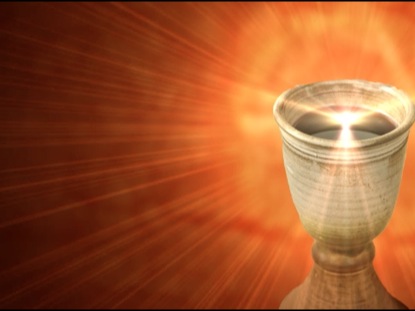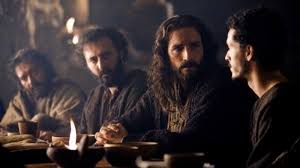Background Passages: Matthew 20:20-23, Ezekiel 23:33, Psalm 116:13, Psalm 23:5-6
“Drink this cup…”
It was a phrase that tickled my ear several weeks ago during our last celebration of the Lord’s Supper. I wasn’t sure why. I had heard it for years. Understood it, I thought, in it’s context. Yet, it kept whispering to me. Maybe it’s time to listen.
The phrase is not unique to scripture. In an ancient Hebrew wedding tradition, a young man poured wine into his cup and invited the woman to drink from his cup. It was her choice. If she drank from the cup, she accepted the betrothal. It was a covenant act. A promise. The act declared that the woman agreed to experience his life in full…the good as well as the bad.
As a result of this old tradition, the cup came to represent a way of life…one that could be a blessing or a curse. The Old Testament prophets used the phrase to condemn Israel’s life apart from the covenant relationship with God. Ezekiel says that Jerusalem drinks from the “cup of ruin and desolation.” (Ezekiel 23:33).
The Psalmist writes to celebrate the manifold gifts of God. “I will take up the cup of salvation…” (Psalm 116:13), pointing toward the promise of eternal life and reward in God’s kingdom.
Jesus used the phrase in a slightly different way to declare the commitment required to do the will of God, regardless of where that life might lead.
My study this week found me reading a passage that illustrated the trouble the disciples had in grasping the mission and purpose of Christ. This common, but misplaced, image of the promised Messiah had them thinking in political terms rather than spiritual terms…a not uncommon issue today when Christians try to cram Jesus’ teachings into a liberal or conservative bucket. But…I digress.
As the passage reads, Jesus is heading toward Jerusalem and the cross. His disciples still had much to understand. The master teacher shared a parable about workers in a vineyard and spoke to them about accountability to the call of God. As they neared the city, he told them directly for the third time about his impending death and resurrection.
The journey toward Jerusalem and all it entailed painted a picture they either chose to ignore completely or opted to interpret with less troubling undertones.
Later, as Jesus and his entourage rested for the evening, Jesus looked up from the tree he was leaning against and saw James and John walking a step behind their mother who was making a beeline straight to Jesus.
She stood for a moment in front of Jesus suddenly less confident in her purpose. Kneeling at his feet, she struggled to find the words she practiced over and over again during their walk that day.
Jesus undoubtedly engaged her in casual conversation, helping her relax. With a lull in the pleasantries, Jesus cocked his head to the left, smiled, and said,
“What is it you want?”
She looked at her sons sitting beside her, hesitated for a moment, the gravity of her request hitting a little harder than she expected.
“Grant that one of these two sons of mine may sit at the right and the other at your left in your kingdom.”
Nothing surprised Jesus. He knew this was coming, but I suspect, in the deep recess of his heart, he was begging her not to go there. She and her sons missed the point.
Jesus’ eyes bore into the souls of James and John, causing them to shrink back a bit. The sounds of the night seemed to fade into the distance. He shook his head in quiet contemplation.
“You don’t know what you’re asking. Can you drink the cup I am to drink?”
The disciples sat up a little straighter, gaining strength one from the other. They looked back at Jesus.
“We can,” expressing a confidence they probably didn’t completely feel.
I know Jesus saw potential in them they could not see in themselves. He knew the life they were capable of living even when they didn’t yet understand its full implications. I wonder if this is where that fleeting moment of frustration at their lack of understanding turned into a gentler word of compassion and encouragement.
“You will indeed drink from my cup…”
Jesus told them that deciding a place of power and honor was not his decision to make nor their question to ask. Embracing the cup…living the call of Christ…was all that mattered. I always saw it as a rebuke for their misunderstand, focusing on the last part of that passage. Maybe it was instead a word of Godly insight. “You will indeed drink my cup.” It was as if Jesus was telling them, “Give it time. You will indeed answer the call.”
This is the concept my mind latched onto this week. “You will drink from my cup…”
Think with me.
You see, later in the week, Jesus and his disciples ate a meal together in the upper room the night before Jesus was crucified. Jesus broke bread, asking them to always remember him and what he was about to do. It’s possible that when he picked up the cup, he looked directly at James and John with that previous conversation in mind.
“Then, he took the cup and after he had given thanks, he gave it to them saying, ‘Drink from it, all of you…” (Matthew 26:27)
It wasn’t an unfamiliar phrase. Certainly, James and John and all the other disciples had been to a wedding or two in their lives. Some of them most certainly had offered their cup to their betrothed, knowing fully what the cup symbolized. A life committed. A promise made.
Their understanding of what it meant to embrace the life of Christ was grounded in a false Messianic narrative of earthly independence from the Roman occupation. A political rather than spiritual concept. To take the cup in their mind was to accept that to the victor go the spoils.
Jesus is drawing a different picture. “You don’t know what you’re asking. You will drink from my cup”…and then in the upper room, it’s no longer a prediction nor an invitation, it is a command…an encouragement…a hope, “Drink from it, all of you.”
For a long, long time, I thought Jesus was telling them to prepare for the same persecution and death that he faced. They certainly faced the persecution and most of them were martyred for their faithfulness. But, to limit the meaning to that aspect of their lives is the miss the point again, I think.
Jesus commanded his disciples…commands us…to drink of his cup. It’s not the wine within or the grape juice. It’s the cup that is important. The liquid represents the blood of Christ, shed for forgiveness of our sins. It’s worth remembering…as often as we do it. Drinking his cup adds a who new concept
Just as the ancient Hebrew wife accepted the cup to say to her future husband, “Where you go, I will go…” “Whatever is your lot is my lot…” “For better or worse…” Jesus is commanding his disciples to embrace the servant and sacrificial life of Christ as their own, the bad with the good. To live a Christ-like life, wholly and completely devoted to God.
Living that life may lead to suffering. When we accept the cup, the life of Christ, we profess an understanding that life within his plan for our lives will almost certainly contain hardship. Drinking from his cup means we willingly walk the lonely path he walked knowing it will be difficult at times.
Jesus, in the Garden of Gethsemane, asked God to take the cup from him, knowing the consequences of his obedience. When God could not release him from the task, Jesus rested in the will of his father. His cup then speaks to our willingness to endure faithfully whatever twists and turns his will and way lays in front of us.
Drinking his cup is not all sacrifice and endurance. There is also glory in the drinking. Paul tells the Roman church that this life is “not worthy to be compared with the glory which shall be revealed in us.” (Romans 8:18) This means that any struggle we encounter while living a Christ-like life ends in victory and glory.
As we drink of the master’s cup, we should understand it as a cup of privilege and a cup of blessing, thanksgiving and praise. a life lived for Christ recognizes the unmerited blessings granted to us each day. His is a cup of grace. His is a cup of thanksgiving. Each day we are allowed to drink of his cup should be a day of gratitude.
The benefit of drinking from his cup is clear. The blessings grow over time. More plentiful. More deeply felt. The Psalmist expressed it far better than i ever could.
“You prepare a table before me in the presence of my enemies; you anoint my head with oil; my cup runs over. Surely goodness and mercy shall follow me all the days of my life; and I will dwell in the house of the Lord forever. (Psalm 23:5-6)
Drinking the cup of Christ means to live a life wholly committed to him. Every day in every way.
Dr. Benjamin Rush, a signer of the Declaration of Independence, wrote in his diary about the feeling in that Philadelphia courtroom when 56 men signed that treasured document. It was a day in which they all drank from the cup of freedom.
“Do you recollect the pensive and awful silence which pervaded the House when we were called up, one after another, to the table of the President of Congress to subscribe to what was believed by many at the time to be our death warrants?”
Their signatures on the Declaration meant certain death at the hands of the British to all who put pen to paper. They signed without knowing how it all would end.
We don’t know what the future holds, but I can promise you this. Jesus commands each of us who put our faith and trust in him to “drink his cup.” To live the life of sacrifice and service that he lived. It won’t be easy, but it will be worth it. His cup brings with it God’s gift of wisdom, courage, boldness and humility to equip us for the work ahead. The hardships are balanced by his abundant blessing and grace.
It is a cup worth drinking. A cup that will make a difference in our world.
I don’t know about you, but my cup runs over.

